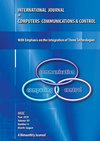使用联邦学习和基于区块链的安全策略优化物联网基础设施的异构性
IF 1.9
4区 计算机科学
Q3 AUTOMATION & CONTROL SYSTEMS
International Journal of Computers Communications & Control
Pub Date : 2023-10-30
DOI:10.15837/ijccc.2023.6.5890
引用次数: 0
摘要
物联网(IoT)及其相关功能在各种规模的复杂系统的规划、操作和管理中变得不可或缺。超越问题边界的高端学习解决方案对于解决物联网环境中的各种通信问题(兼容性、安全通信等)是必要的。从不同的数据源构建机器学习(ML)网络是一种被称为联邦学习(FL)的前沿实践。在本文中,我们在人口稀少的云中实现基于边缘的服务器和设备之间的FL,以促进智能物联网系统中关键信息的内聚学习和存储。FL通过聚集较小的单元模型,通过规范的边缘网络参与者,从一个共同的模型进行协作训练。此外,所有易受影响设备的信息和敏感消息交易都通过区块链技术进行处理。因此,集成了基于区块链的安全机制,以保护用户隐私并促进广泛的实际采用。最后,将提出的模型与目前使用的三个最好的免费开源联邦学习模型(FedPD、FedProx和fedag)进行比较。在统计和数据异质性方面(SDI >70%,准确率>97%),实验结果表明,所提出的模型优于现有技术。本文章由计算机程序翻译,如有差异,请以英文原文为准。
Optimizing Heterogeneity in IoT Infra Using Federated Learning and Blockchain-based Security Strategies
The Internet of Things (IoT) and associated capabilities are becoming indispensable in the planning, operation, and administration of intricate systems of all sizes. High-end learning solutions that go beyond the boundaries of the problem are necessary for addressing the variety of communication concerns (compatibility, secure communication, etc.) in IoT settings. Building machine learning (ML) networks from disparate data sources is a cutting-edge practice known as Federated Learning (FL). In this article, we implement FL between edge-based servers and devices in a sparsely populated cloud to facilitate cohesive learning and the storage of critical information in smart IoT systems. FL enables collaborative training from a common model by aggregating smaller unit models via regulated edge network participants. Further, all the susceptible device’s information and sensitive message transactions are addressed via blockchain technology. Thus, a blockchain-based security mechanism is integrated to secure user privacy and facilitate widespread practical adoption. Finally, a comparison is made between the proposed model and the three best free, open-source Federated Learning models already in use (FedPD, FedProx, and FedAvg). In terms of statistical, and data heterogeneity (>70% SDI, >97% accuracy), the experimental findings suggest that the proposed model performs better than the existing techniques.
求助全文
通过发布文献求助,成功后即可免费获取论文全文。
去求助
来源期刊
CiteScore
5.10
自引率
7.40%
发文量
55
审稿时长
6-12 weeks
期刊介绍:
International Journal of Computers Communications & Control is directed to the international communities of scientific researchers in computers, communications and control, from the universities, research units and industry. To differentiate from other similar journals, the editorial policy of IJCCC encourages the submission of original scientific papers that focus on the integration of the 3 "C" (Computing, Communications, Control).
In particular, the following topics are expected to be addressed by authors:
(1) Integrated solutions in computer-based control and communications;
(2) Computational intelligence methods & Soft computing (with particular emphasis on fuzzy logic-based methods, computing with words, ANN, evolutionary computing, collective/swarm intelligence);
(3) Advanced decision support systems (with particular emphasis on the usage of combined solvers and/or web technologies).

 求助内容:
求助内容: 应助结果提醒方式:
应助结果提醒方式:


